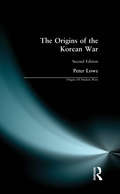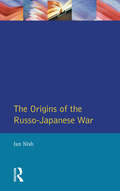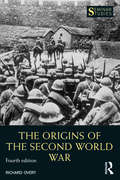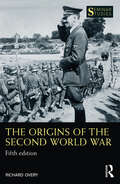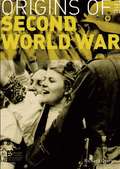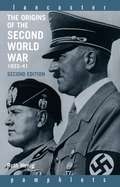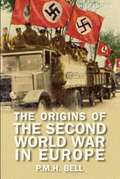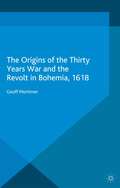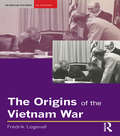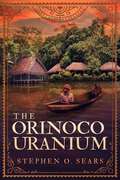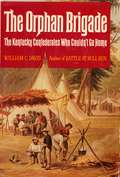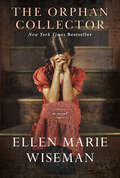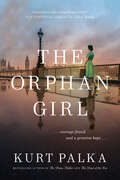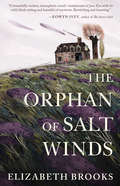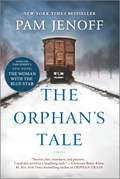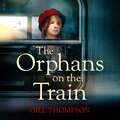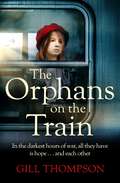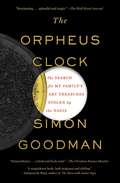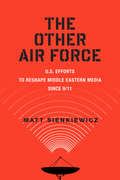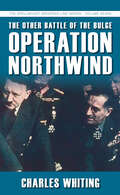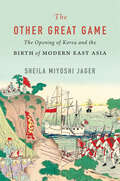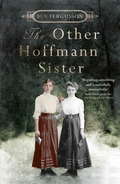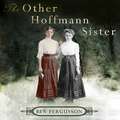- Table View
- List View
The Origins of the Korean War: Second Edition (Origins Of Modern Wars)
by Peter LoweThe impressive Second Edition of this standard study incorporates important new evidence on the origins of the war from Chinese and Russian archives. It reveals that Stalin encouraged the attack on South Korea, but also confirms that the original initiative came from North Korea. Peter Lowe has also written an extended conclusion with a discussion of the Koreas in the late 1990s, and the challenges involved in securing their reunification.
The Origins of the Russo-Japanese War (Origins Of Modern Wars)
by Ian NishThe Russo-Japanese war of 1904-5 has been seen as the turning point of the development of the modern world. Written by a specialist in Japanese diplomacy, this book has been described by the Times Higher Education Supplement as 'diplomatic history at its very best'.
The Origins of the Second World War
by Richard OveryExploring the reasons why the Second World War broke out in September 1939 and why a European conflict developed into a war that spanned the globe, The Origins of the Second World War argues that this was not just ‘Hitler’s War’ but one that had its roots and origins in the decline of the old empires of Britain and France and the rise of ambitious new powers in Germany, Italy and Japan who wanted large empires of their own. This fourth edition has been revised throughout, covering the origins of the war from its background in the First World War to its expansion to embrace the Soviet Union, Japan and the United States by the end of 1941. Creating a comprehensive and analytical narrative while remaining a succinct overview of the subject, this book takes a thematic approach to the complex range of events that culminated in global warfare, discussing factors such as economic rivalry, rearmament and domestic politics and emphasising that any explanation of the outbreak of hostilities must be global in scope. Containing updated references and primary source documents alongside a glossary, a chronology of key events and a Who’s Who of important figures, this book is an invaluable introduction for any student of this fascinating period.
The Origins of the Second World War (Seminar Studies)
by Richard OveryNow in its fifth edition, The Origins of the Second World War explores the reasons why the Second World War broke out in September 1939 and why a European conflict developed into a war that spanned the globe. This book argues that the global conflict was not just ‘Hitler’s War’ but one that had its roots and origins in the decline of the old empires of Britain and France and the rise of ambitious new powers in Germany, Italy and Japan who wanted large empires of their own. Richard Overy covers the origins of the war from its background in the First World War to its expansion to embrace the Soviet Union, Japan and the United States by the end of 1941. Creating a comprehensive and analytical narrative while remaining a succinct overview of the subject, this book takes a thematic approach to the complex range of events that culminated in global warfare, discussing factors such as economic rivalry, rearmament and domestic politics and emphasizing that any explanation of the outbreak of hostilities must be global in scope. This new edition includes more discussion of the role of empire and the imperial background to the war. Containing several new primary source documents alongside a glossary, a chronology of key events and a who’s who of important figures, this book is an invaluable introduction for any student of this fascinating period in history.
The Origins of the Second World War (Third Edition)
by Richard OveryThe book provides a detailed overview of the antecedents leading up to and causing the onset of the Second World War and this edition incorporates material that has become available to the public now on the Soviet Union .
The Origins of the Second World War 1933-1941 (Lancaster Pamphlets)
by Ruth HenigUpdated and expanded throughout to take into consideration the most up-to-date historical research, this new edition of The Origins of the Second World War analyzes the reasons for the outbreak of the Second World War. Experienced historian Ruth Henig considers: * the long-term factors that led to war* the effect of British appeasement policies* the significance of American isolation* the ambitions of Italy, Japan and Russia. The Origins of the Second World War brings one of the most controversial historical topics to life for a whole generation of students and scholars seeking to understand the reasoning and events behind this major event in world history.
The Origins of the Second World War in Europe
by P. M. H. BellThese are the tasks which a consideration of the origins of the war (or rather, wars) must face. But what is meant by 'origins' in this context? It is possible to seek the origins of the war in the events of diplomatic relations - the alliances and alignments of states, the activities of ambassadors and foreign ministers, conferences between statesmen. It may be, however, that such matters were merely superficial, eddies on the surface of a deep-running stream whose course was determined by more profound forces. If so, what were these forces? Obvious possibilities may be found in the movement of ideas and the clash of ideologies; in economic pressures and opportunities; and in changes in military technology and strategic thought. If we accept the importance of such developments, what were the links between them and the decisions of individual statesmen and the sentiments of peoples?
The Origins of the Thirty Years War and the Revolt in Bohemia, 1618
by Geoff MortimerAs the 400th anniversary of the outbreak of the Thirty Years War approaches, Geoff Mortimer provides a timely re-assessment of its origins. These lie mainly neither in religious tensions in Germany nor in the conflicts between Spain, France and the Dutch, but in the revolt in Bohemia and the famous defenestration of Prague.
The Origins of the Vietnam War (Seminar Studies)
by Fredrik LogevallWhy did the US make a commitment to an independent South Vietnam? Could a major war have been averted? Fredrik Logevall provides a concise, comprehensive and accessible introduction to the origins of the Vietnam War from the end of the Indochina War in 1954 to the eruption of full-scale war in 1965, and places events against their full international background.
The Orinoco Uranium
by Stephen O. Sears&“...an exciting tale rife with intrigue, adventure, and mystery.&” — Wayne Abrahamson (US Navy, retired). Author of Black Silver and Sergeant Dooley and the Submarine Raiders.Inspired by a series of true events and based on detailed research and personal knowledge of the history and geology of Venezuela, The Orinoco Uranium is a story of conflict and survival in WWII South America. In the spring of 1944, a geophysical survey party detects a cargo of smuggled uranium on a stranded ship. Beached on the Orinoco River bank after a fierce storm, the ship was enroute from Nazi Germany to Argentina with radioactive metal stolen from a Berlin laboratory. The renegade German physicist behind the theft intends to use the cargo as a passport to a new life in South America. American geologist Jerry MacDonald and his wife, Maria, are living and working in the scenic lakeside community of Maracaibo, a city of intrigue and espionage in neutral Venezuela. Looking for new oil felds, Jerry leads the geophysical survey party to the Orinoco River delta, deep in the South American wilderness. When he informs the American government about the strange discovery of the uranium upon his return to Maracaibo, the ensuing efforts to seize it by both Germans and Americans cause a violent encounter in the South Atlantic Ocean.
The Orphan Brigade: The Kentucky Confederates Who Couldn't Go Home
by William C. DavisOn September 18, 1861, ominous sounds of battle thundering in the distance, the Kentucky legislature voted to align itself with the Union. It was a decision which tore at the heart of the state, splitting apart families and severing friendships. For the newly formed First Kentucky Brigade, it marked a four-year separation from the beloved homeland. Fiercely independent to the end, these men would fight for the cause of the South. With their first march into battle, they became outcasts from their mother state -- orphans in the raging strife of civil war. William C. Davis has written a gripping story of the rebel troops whose remarkable spirit and tenacity were heralded throughout the Confederacy. The First Kentucky Brigade was "baptized in fire and blood" at the Battle of Shiloh and went on to serve with great distinction at Vicksburg, Baton Rouge, Chickamauga, and the fight for Atlanta. In this vivid narrative, the author captures the searing drama of each battle, as well as the unbearable drudgery of the months between. We see men of all backgrounds and ranks coming to grips with the war: some of them, renowned leaders such as John C. Breckinridge; others, young soldiers learning the horror of death for the first time. Drawing from a wealth of documents, memoirs, personal letters, and journals, Davis brings to life the fascinating history of the Civil War's "Orphan Brigade."
The Orphan Collector: A Heroic Novel of Survival During the 1918 Influenza Pandemic
by Ellen Marie WisemanInstant New York Times BestsellerFrom the internationally bestselling author of What She Left Behind comes a gripping and powerful tale of upheaval—a heartbreaking saga of resilience and hope perfect for fans of Beatriz Williams and Kristin Hannah—set in Philadelphia during the 1918 Spanish Flu outbreak—the deadly pandemic that went on to infect one-third of the world&’s population…&“Readers will not be able to help making comparisons to the COVID-19 pandemic, and how little has changed since 1918. Wiseman has written a touching tale of loss, survival, and perseverance with some light fantastical elements. Highly recommended.&” —Booklist&“An immersive historical tale with chilling twists and turns. Beautifully told and richly imagined.&” —Stephanie Dray, New York Times bestselling author of America&’s First Daughter In the fall of 1918, thirteen-year-old German immigrant Pia Lange longs to be far from Philadelphia&’s overcrowded slums and the anti-immigrant sentiment that compelled her father to enlist in the U.S. Army. But as her city celebrates the end of war, an even more urgent threat arrives: the Spanish flu. Funeral crepe and quarantine signs appear on doors as victims drop dead in the streets and desperate survivors wear white masks to ward off illness. When food runs out in the cramped tenement she calls home, Pia must venture alone into the quarantined city in search of supplies, leaving her baby brothers behind. Bernice Groves has become lost in grief and bitterness since her baby died from the Spanish flu. Watching Pia leave her brothers alone, Bernice makes a shocking, life-altering decision. It becomes her sinister mission to tear families apart when they&’re at their most vulnerable, planning to transform the city&’s orphans and immigrant children into what she feels are &“true Americans.&” Waking in a makeshift hospital days after collapsing in the street, Pia is frantic to return home. Instead, she is taken to St. Vincent&’s Orphan Asylum – the first step in a long and arduous journey. As Bernice plots to keep the truth hidden at any cost in the months and years that follow, Pia must confront her own shame and fear, risking everything to see justice – and love – triumph at last. Powerful, harrowing, and ultimately exultant, The Orphan Collector is a story of love, resilience, and the lengths we will go to protect those who need us most. &“Wiseman&’s writing is superb, and her descriptions of life during the Spanish Flu epidemic are chilling. Well-researched and impossible to put down, this is an emotional tug-of-war played out brilliantly on the pages and in readers&’ hearts.&” —The Historical Novels Review, EDITOR&’S CHOICE &“Wiseman&’s depiction of the horrifying spread of the Spanish flu is eerily reminiscent of the present day and resonates with realistic depictions of suffering, particularly among the poorer immigrant population.&” —Publishers Weekly (Boxed Review) &“Reading the novel in the time of COVID-19 adds an even greater resonance, and horror, to the description of the fatal spread of that 1918 flu.&” —Kirkus Review &“An emotional roller coaster…I felt Pia&’s strength, courage, guilt, and grief come through the pages clear as day.&” —The Seattle Book Review
The Orphan Girl: A WWII Novel of Courage Found and a Promise Kept
by Kurt PalkaFor fans of Kristin Harmel and Martha Hall Kelly's Lilac Girls -- the bestselling author of The Piano Maker returns with a vivid, atmospheric, and deeply moving novel set during the final months of the Second World War.London, 1944/45Kate Henderson is an energetic and spirited young woman. As a trained paramedic and ambulance driver she does her work courageously and with determination, even though underneath she is still wrestling with grief after witnessing the shooting death of her diplomat father seven years earlier. Her father&’s murder was never properly investigated and it remains unsolved.Kate&’s life is interrupted once more when she wakes up one night to the sound of the air raid alarm and the terror whistles of a bomb&’s stabilizers screaming toward the roof of her house. Kate survives, but she is injured.Her house is gone as well, and after her time in the hospital, Claire Giroux, a kind doctor and family friend, invites Kate to live with her as she recuperates. This arrangement works well for them until a few months later when Claire&’s husband comes home from the war. Within days the lives of both women are drastically altered, and events are set in motion, both in England and in Canada, that challenge Kate and Claire to their limits.The Orphan Girl is a moving and powerful story about friendship and courage, and about promises made and kept.
The Orphan of Salt Winds
by Elizabeth BrooksFor fans of Eowyn Ivey, Rose Tremaine, and Kate Atkinson, The Orphan of Salt Winds is a bewitching debut about the secrets that haunt us. England, 1939. Ten-year-old Virginia Wrathmell arrives at Salt Winds, a secluded house on the edge of a marsh, to meet her adoptive parents—practical, dependable Clem and glamorous, mercurial Lorna. The marsh, with its deceptive tides, is a beautiful but threatening place. Virginia’s new parents’ marriage is full of secrets and tensions she doesn’t quite understand, and their wealthy neighbor, Max Deering, drops by too often, taking an unwholesome interest in the family’s affairs. Only Clem offers a true sense of home. War feels far away among the birds and shifting sands—until the day a German fighter plane crashes into the marsh, and Clem ventures out to rescue the airman. What happens next sets into motion a crime so devastating it will haunt Virginia for the rest of her life. Seventy-five years later, she finds herself drawn back to the marsh, and to a teenage girl who appears there, nearly frozen and burdened by her own secrets. In her, Virginia might have a chance at retribution and a way to right a grave mistake she made as a child. Elizabeth Brooks’s gripping debut mirrors its marshy landscape—full of twists and turns and moored in a tangle of family secrets. A gothic, psychological mystery and atmospheric coming-of-age story, The Orphan of Salt Winds is the portrait of a woman haunted by the place she calls home.
The Orphan's Tale: A Novel (Mira Ser.)
by Pam JenoffLook for Pam Jenoff&’s new novel, The Woman with the Blue Star, an unforgettable story of courage and friendship during wartime.A New York Times bestseller!&“Readers who enjoyed Kristin Hannah&’s The Nightingale and Sara Gruen&’s Water for Elephants will embrace this novel. &“ —Library Journal&“Secrets, lies, treachery, and passion…. I read this novel in a headlong rush.&” —Christina Baker Kline, #1 New York Times bestselling author of Orphan TrainA powerful novel of friendship set in a traveling circus during World War II, The Orphan&’s Tale introduces two extraordinary women and their harrowing stories of sacrifice and survival.Sixteen-year-old Noa has been cast out in disgrace after becoming pregnant by a Nazi soldier and being forced to give up her baby. She lives above a small rail station, which she cleans in order to earn her keep… When Noa discovers a boxcar containing dozens of Jewish infants bound for a concentration camp, she is reminded of the child that was taken from her. And in a moment that will change the course of her life, she snatches one of the babies and flees into the snowy night.Noa finds refuge with a German circus, but she must learn the flying trapeze act so she can blend in undetected, spurning the resentment of the lead aerialist, Astrid. At first rivals, Noa and Astrid soon forge a powerful bond. But as the facade that protects them proves increasingly tenuous, Noa and Astrid must decide whether their friendship is enough to save one another—or if the secrets that burn between them will destroy everything.Don&’t miss Pam Jenoff&’s new novel, Code Name Sapphire, a riveting tale of bravery and resistance during World War II.Read these other sweeping epics from New York Times bestselling author Pam Jenoff:The Woman with the Blue StarThe Lost Girls of ParisThe Ambassador&’s DaughterThe Diplomat&’s WifeThe Last Summer at Chelsea BeachThe Kommandant&’s GirlThe Winter Guest
The Orphans on the Train: Gripping and heartrending historical fiction of two orphaned girls in WW2
by Gill ThompsonA gripping, moving story of loss, friendship, the need to belong, inspired by real events, of two orphaned girls and the woman who becomes a surrogate mother to them, only to be separated in the most heart-wrenching way.Two orphaned girls become found family amidst the horrors of WWII in a gripping and heart-wrenching tale of friendship, loss and survival against the odds which sweeps the reader across wartime Europe to Budapest from the mountains of Scotland. Inspired by true events and perfect for readers of The Nightingale and The Midwife of Auschwitz, from the author of The Child on Platform One and The Lighthouse Sisters.Listeners LOVE Gill Thompson's moving and heart-wrenching novels:'The characters and their moving stories will haunt you long after you finish the last page' Shirley Dickson'A warm-hearted tale of love, loss and indefatigable human spirit' Kathryn Hughes'A heartrending story' Jane Corry'A mother's loss and a son's courage . . . A heartrending story that spans the world' Diney Costeloe(P) 2023 Headline Publishing Group Ltd
The Orphans on the Train: Gripping and heartrending historical fiction of two orphaned girls in WW2
by Gill Thompson'Exciting and tragic . . . beautifully written' ⭐ ⭐ ⭐ ⭐ ⭐ 'A fantastic historical read' ⭐ ⭐ ⭐ ⭐ ⭐ 'I loved it!' ⭐ ⭐ ⭐ ⭐ ⭐ 'I highly recommend it to all lovers of historical fiction' ⭐ ⭐ ⭐ ⭐ ⭐ Two orphaned girls are separated in the most heart-wrenching way in this gripping story of loss and friendship, inspired by real events. Perfect for readers of The Nightingale and The Midwife of Auschwitz. ----- 1939. A girl with auburn hair looks anxiously out of the train window, watching the mountains of Europe pass by. War is on the horizon at home, and Kirsty finds herself heading to neutral Hungary to help in a school for Jewish children. Little does she know that in leaving everything behind, she is about to find the most precious gift of all - a true friend in school pupil Anna. 1943. When the Nazis invade Budapest, Kirsty and Anna are on their own, and Kirsty worries desperately for her Jewish friend. What lengths must they go to in order to survive, and, when they are separated, can the guiding light of friendship bring them back to each other? Your favourite historical authors LOVE this moving and heart-wrenching novel: 'A powerful, poignant story of survival' KATE HEWITT 'A different aspect of the Second World War to any I've read before . . . both heartbreaking and compelling, yet ultimately uplifting. I loved it' DEBORAH CARR 'This is a story of amazing courage . . . an extraordinary novel that has stayed with me long after I turned the final page' CAROL McGRATH 'Beautiful and evocative . . . an intelligent, thrilling novel which will stay with me for a long time' LOUISE MORRISH
The Orphans on the Train: Gripping and heartrending historical fiction of two orphaned girls in WW2
by Gill Thompson'Exciting and tragic . . . beautifully written' ⭐ ⭐ ⭐ ⭐ ⭐ 'A fantastic historical read' ⭐ ⭐ ⭐ ⭐ ⭐ 'I loved it!' ⭐ ⭐ ⭐ ⭐ ⭐ 'I highly recommend it to all lovers of historical fiction' ⭐ ⭐ ⭐ ⭐ ⭐ Two orphaned girls are separated in the most heart-wrenching way in this gripping story of loss and friendship, inspired by real events. Perfect for readers of The Nightingale and The Midwife of Auschwitz. ----- 1939. A girl with auburn hair looks anxiously out of the train window, watching the mountains of Europe pass by. War is on the horizon at home, and Kirsty finds herself heading to neutral Hungary to help in a school for Jewish children. Little does she know that in leaving everything behind, she is about to find the most precious gift of all - a true friend in school pupil Anna. 1943. When the Nazis invade Budapest, Kirsty and Anna are on their own, and Kirsty worries desperately for her Jewish friend. What lengths must they go to in order to survive, and, when they are separated, can the guiding light of friendship bring them back to each other? Your favourite historical authors LOVE this moving and heart-wrenching novel: 'A powerful, poignant story of survival' KATE HEWITT 'A different aspect of the Second World War to any I've read before . . . both heartbreaking and compelling, yet ultimately uplifting. I loved it' DEBORAH CARR 'This is a story of amazing courage . . . an extraordinary novel that has stayed with me long after I turned the final page' CAROL McGRATH 'Beautiful and evocative . . . an intelligent, thrilling novel which will stay with me for a long time' LOUISE MORRISH
The Orpheus Clock
by Simon GoodmanThe passionate, gripping, true story of one man's single-minded quest to reclaim what the Nazis stole from his family, their beloved art collection, and to restore their legacy.Simon Goodman's grandparents came from German-Jewish banking dynasties and perished in concentration camps. And that's almost all he knew about them--his father rarely spoke of their family history or heritage. But when he passed away, and Simon received his father's old papers, a story began to emerge. The Gutmanns, as they were known then, rose from a small Bohemian hamlet to become one of Germany's most powerful banking families. They also amassed a magnificent, world-class art collection that included works by Degas, Renoir, Botticelli, Guardi, and many, many others. But the Nazi regime snatched from them everything they had worked to build: their remarkable art, their immense wealth, their prominent social standing, and their very lives. Simon grew up in London with little knowledge of his father's efforts to recover their family's prized possessions. It was only after his father's death that Simon began to piece together the clues about the Gutmanns' stolen legacy and the Nazi looting machine. He learned much of the collection had gone to Hitler and Hermann Goering; other works had been smuggled through Switzerland, sold and resold to collectors and dealers, with many works now in famous museums. More still had been recovered by Allied forces only to be stolen again by heartless bureaucrats--European governments quietly absorbed thousands of works of art into their own collections. Through painstaking detective work across two continents, Simon has been able to prove that many works belonged to his family, and successfully secure their return. With the help of his family, Simon initiated the first Nazi looting case to be settled in the United States. They also brought about the first major restitution in The Netherlands since the post-war era. Goodman's dramatic story, told with great heart, reveals a rich family history almost obliterated by the Nazis. It is not only the account of a twenty-year long detective hunt for family treasure, but an unforgettable tale of redemption and restoration.
The Other Air Force: U.S. Efforts to Reshape Middle Eastern Media Since 9/11
by Mr Matt SienkiewiczAs it seeks to win the hearts and minds of citizens in the Muslim world, the United States has poured millions of dollars into local television and radio programming, hoping to generate pro-American currents on Middle Eastern airwaves. However, as this fascinating new book shows, the Middle Eastern media producers who rely on these funds are hardly puppets on an American string, but instead contribute their own political and creative agendas while working within U.S. restrictions. The Other Air Force gives readers a unique inside look at television and radio production in Afghanistan and the Palestinian territories, from the isolated villages of the Afghan Panjshir Valley to the congested streets of Ramallah. Communications scholar Matt Sienkiewicz explores how the U.S. takes a "soft-psy" approach to its media efforts combining "soft" methods of encouraging entertainment programming, such as adaptations of The Voice and The Apprentice with more militaristic "psy-ops" approaches to information control. Drawing from years of field research and interviews with everyone from millionaire executives to underpaid but ever resourceful cameramen, Sienkiewicz considers the perspectives of the Afghan and Palestinian media workers trying to forge viable broadcasting businesses without straying outside American-set boundaries for acceptable content. As it carefully examines the interplay of U.S. military and economic might with the capacity for local ingenuity and resistance, the book also analyzes the intriguingly complex programming that emerges from this tension. Combining eyewitness reportage with cutting-edge scholarship, The Other Air Force reveals the remarkable creative output that can emerge even from the world's tensest conflict zones.
The Other Battle of the Bulge: The Spellmount Siegfried Line Series Volume Seven
by Charles WhitingOperation Northwind was the little-known second Battle of the Bulge, which cost the Americans and their French comrades-in-arms nearly as many casualties and almost detroyed the Alliance. It was planned by the Fuhrer himself, which hurled eight German divisions, three of them SS, against the thinly-held American line in the Alsace-Lorraine region. Although the US High Command was forewarned by 'Ultra' from Bletchley, the German pressure was just too much. The Americans were forced to retreat.For the first time during the campaign in the West, Eisenhower ordered his troops to give up ground paid for by so many lives and commanding that Stratbourg, which held a special place in both French and German hearts, should be evacuated. This sparked off a row which threatened to destroy the Franco-American Alliance and throw France into a dramatic revolution.Quick moving and action-packed, this book sees the events through the eyes of the soldiers who were 'at the sharp end', and fills a major gap in the history of World War II.
The Other Great Game: The Opening of Korea and the Birth of Modern East Asia
by Sheila Miyoshi JagerA dramatic new telling of the dawn of modern East Asia, placing Korea at the center of a transformed world order wrought by imperial greed and devastating wars.In the nineteenth century, Russia participated in two “great games”: one, well known, pitted the tsar’s empire against Britain in Central Asia. The other, hitherto unrecognized but no less significant, saw Russia, China, and Japan vying for domination of the Korean Peninsula. In this eye-opening account, brought to life in lucid narrative prose, Sheila Miyoshi Jager argues that the contest over Korea, driven both by Korean domestic disputes and by great-power rivalry, set the course for the future of East Asia and the larger global order.When Russia’s eastward expansion brought it to the Korean border, an impoverished but strategically located nation was wrested from centuries of isolation. Korea became a prize of two major imperial conflicts: the Sino-Japanese War at the close of the nineteenth century and the Russo-Japanese War at the beginning of the twentieth. Japan’s victories in the battle for Korea not only earned the Meiji regime its yearned-for colony but also dislodged Imperial China from centuries of regional supremacy. And the fate of the declining tsarist empire was sealed by its surprising military defeat, even as the United States and Britain sized up the new Japanese challenger.A vivid story of two geopolitical earthquakes sharing Korea as their epicenter, The Other Great Game rewrites the script of twentieth-century rivalry in the Pacific and enriches our understanding of contemporary global affairs, from the origins of Korea’s bifurcated identity—a legacy of internal politics amid the imperial squabble—to China’s irredentist territorial ambitions and Russia’s nostalgic dreams of recovering great-power status.
The Other Hoffmann Sister
by Ben FergussonShortlisted for The Sunday Times Young Writer of the Year 2015, Ben Fergusson's critically acclaimed debut, The Spring of Kasper Meier, was the winner of the Betty Trask Prize 2015 and the HWA 2015 Debut Crown Award. The Other Hoffmann Sister is a gripping, evocative read about two sisters set in pre-WW1 Germany which will appeal to fans of The Essex Serpent by Sarah Perry.For Ingrid Hoffmann the story of her sister's disappearance began in their first weeks in Southwest Africa...Ingrid Hoffmann has always felt responsible for her sister Margarete and when their family moves to German Southwest Africa in 1902, her anxieties only increase. The casual racism that pervades the German community, the strange relationship between her parents and Baron von Ketz, from whom they bought their land, and the tension with the local tribes all culminate in tragedy when Baron von Ketz is savagely murdered. Baroness von Ketz and their son, Emil, flee with the Hoffmanns as the Baron's attackers burn down the family's farm.Both families return to Berlin and Ingrid's concerns about Margarete are assuaged when she and Emil von Ketz become engaged on the eve of the First World War. But Margarete disappears on her wedding night at the von Ketz's country house. The mystery of what happened to her sister haunts Ingrid, but as Europe descends into chaos, her hope of discovering the truth becomes ever more distant.After the war, in the midst of the revolution that brings down the Kaiser and wipes out the aristocracy that her family married into, Ingrid returns to the von Ketzes' crumbling estate determined to find out what really happened to her sister.
The Other Hoffmann Sister
by Ben FergussonShortlisted for The Sunday Times Young Writer of the Year 2015, Ben Fergusson's critically acclaimed debut, The Spring of Kasper Meier, was the winner of the Betty Trask Prize 2015 and the HWA 2015 Debut Crown Award. The Other Hoffmann Sister is a gripping, evocative read about two sisters set in pre-WW1 Germany which will appeal to fans of The Essex Serpent by Sarah Perry.For Ingrid Hoffmann the story of her sister's disappearance began in their first weeks in Southwest Africa...Ingrid Hoffmann has always felt responsible for her sister Margarete and when their family moves to German Southwest Africa in 1902, her anxieties only increase. The casual racism that pervades the German community, the strange relationship between her parents and Baron von Ketz, from whom they bought their land, and the tension with the local tribes all culminate in tragedy when Baron von Ketz is savagely murdered. Baroness von Ketz and their son, Emil, flee with the Hoffmanns as the Baron's attackers burn down the family's farm.Both families return to Berlin and Ingrid's concerns about Margarete are assuaged when she and Emil von Ketz become engaged on the eve of the First World War. But Margarete disappears on her wedding night at the von Ketz's country house. The mystery of what happened to her sister haunts Ingrid, but as Europe descends into chaos, her hope of discovering the truth becomes ever more distant.After the war, in the midst of the revolution that brings down the Kaiser and wipes out the aristocracy that her family married into, Ingrid returns to the von Ketzes' crumbling estate determined to find out what really happened to her sister.
The Other Hoffmann Sister
by Ben FergussonShortlisted for The Sunday Times Young Writer of the Year 2015, Ben Fergusson's critically acclaimed debut, The Spring of Kasper Meier, was the winner of the Betty Trask Prize 2015 and the HWA 2015 Debut Crown Award. The Other Hoffmann Sister is a gripping, evocative read about two sisters set in pre-WW1 Germany which will appeal to fans of The Essex Serpent by Sarah Perry.For Ingrid Hoffmann the story of her sister's disappearance began in their first weeks in Southwest Africa...Ingrid Hoffmann has always felt responsible for her sister Margarete and when their family moves to German Southwest Africa in 1902, her anxieties only increase. The casual racism that pervades the German community, the strange relationship between her parents and Baron von Ketz, from whom they bought their land, and the tension with the local tribes all culminate in tragedy when Baron von Ketz is savagely murdered. Baroness von Ketz and their son, Emil, flee with the Hoffmanns as the Baron's attackers burn down the family's farm.Both families return to Berlin and Ingrid's concerns about Margarete are assuaged when she and Emil von Ketz become engaged on the eve of the First World War. But Margarete disappears on her wedding night at the von Ketz's country house. The mystery of what happened to her sister haunts Ingrid, but as Europe descends into chaos, her hope of discovering the truth becomes ever more distant.After the war, in the midst of the revolution that brings down the Kaiser and wipes out the aristocracy that her family married into, Ingrid returns to the von Ketzes' crumbling estate determined to find out what really happened to her sister.
